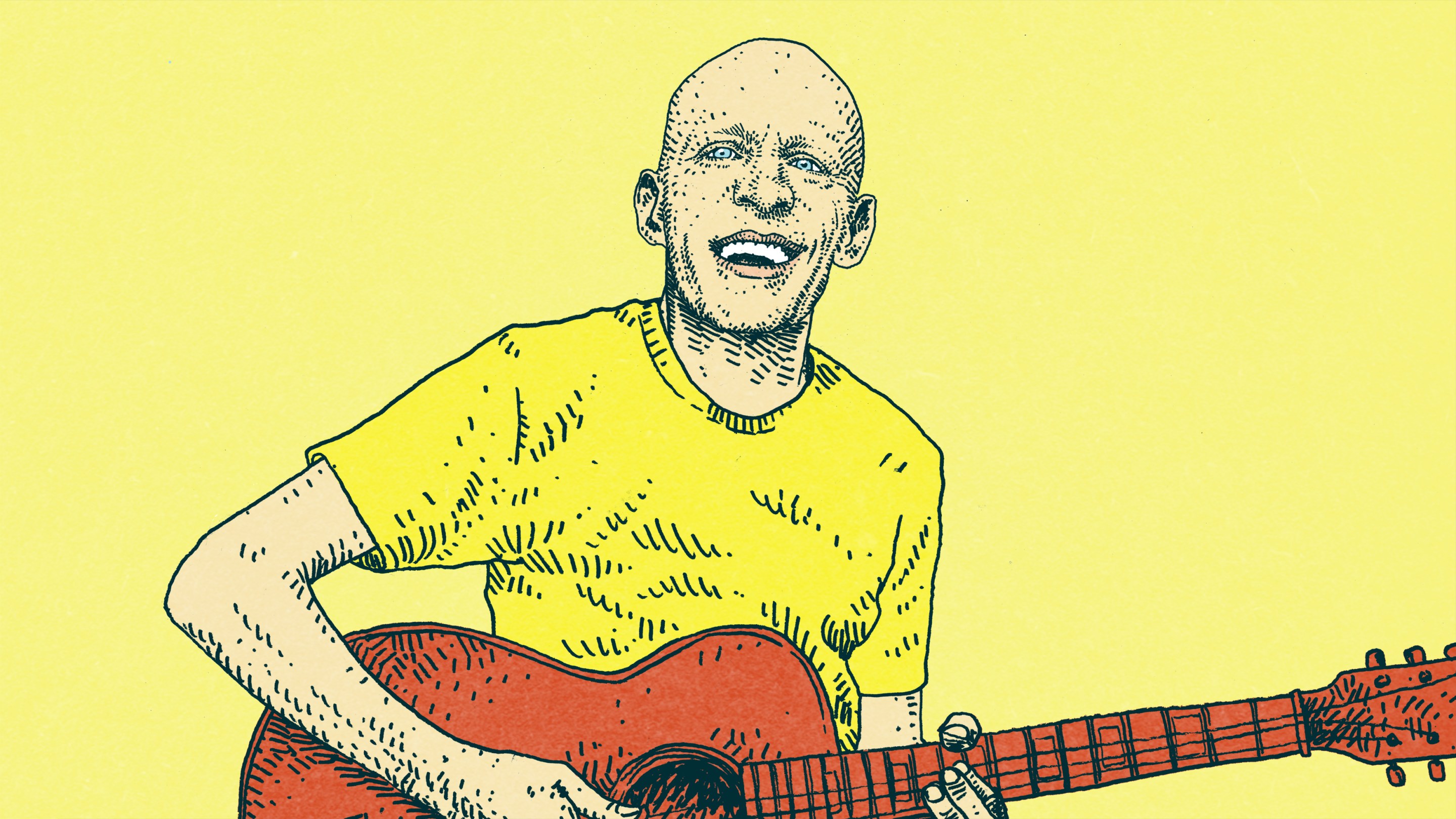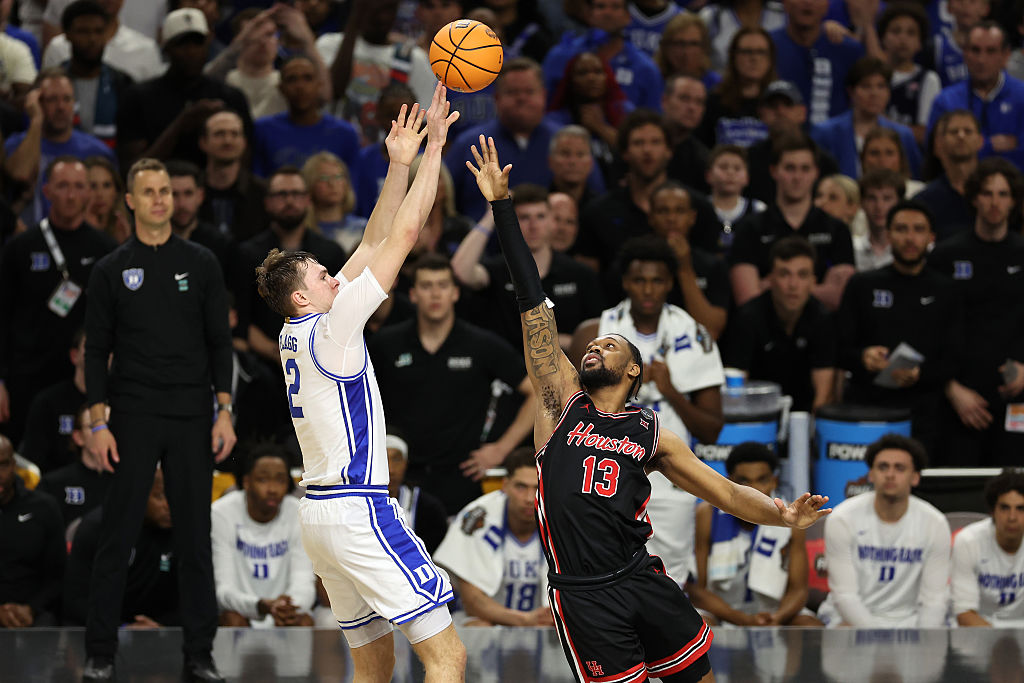The first time I saw Caspar Babypants in concert was at a farmer’s market in Auburn, Washington, a diverse suburb about 30 minutes southeast of Seattle. He set up away from the produce and flower booths on a stool in an open plaza beside a train station. There was a single amp, there were a pair of speakers on high stands, and there was a small merch table off to the side covered in CDs and books.
A half-circle of children, parents, and grandparents grew and then tightened around the main attraction: a thin middle-aged white man wearing a throwback Mariners cap over his bald head, a flannel over his yellow t-shirt, and black Adidas. (Caspar Babypants has a carefully curated aesthetic; “I took a page from David Byrne's playbook when he said if you want to be famous, always wear the same suit,” he told me.)
Finally, in a voice that would be familiar to anybody who listened to the radio in America in the 1990s, he began to sing. The half-circle exploded into what can only be described as the toddler version of a mosh pit, featuring some very silly dancing—including from my older son, who was about a year old at the time, and deeply enthralled.
I don’t remember the setlist, but I remember that he played “My Flea Has Dogs,” and “Stompy the Bear,” and of course his biggest hit, “Run Baby Run.” When a train passed by, drowning out the music, he stopped singing and yelled “TRAIN SOLOOOO.” It was fun.
We bought a CD from Caspar at the merch table that day. We asked him what his best album was for rocking out in the car and he said that all of his records were made for rocking out in the car. This was the moment that it first occurred to me to write about Caspar Babypants. In my head, the pitch went something like this:
“Why did Chris Ballew, formerly the frontman of major label, multi-platinum rock band The Presidents of the United States of America, leave it all behind to make DIY kids music with a narrow regional following?”
But that was more than five years ago. During those years, my wife and I had another son, attended more of his concerts, and listened to all of his records. We also listened to a lot of other music with our kids. Eventually I came to realize that the novelty of Ballew’s past as the guy who sang “Peaches” and “Lump” was actually the least interesting thing about Caspar Babypants.
More interesting was the amount of care and creativity he was putting into the songs, hundreds of tiny pop masterpieces with silly lyrics about animals and food and tugboats that unlike most kids music actually respected kids; more interesting was the sheer volume of the output; more interesting was the intentionally DIY nature of the whole operation. This was not just a musical whim, but an entire creative project spanning years. Caspar Babypants had found a way to build an ethical, sustainable artistic life completely on his own terms.
When I finally figured all this out for myself, and called him up to talk about it, I was not at all surprised to learn that Ballew had thought deeply about this stuff. He had a lot of insightful things to say about art and commerce and making music for kids. But I was very surprised to learn that he was done with that last thing. On Nov. 5, Ballew will release his final album as Caspar Babypants. It’s called Easy Breezy!
“I'm out of songs,” he said. “I'm not only out of songs, I've really said what I have to say. I mean 19 records, and these records have 20 songs on each record. I just can't sing any more about bugs and animals and food and nature and babies and love. I think I've done it.”
Then we started talking about consciousness.
In retrospect, Chris Ballew has the perfect origin story for a composer of imaginative pop songs for kids. He was not quite three years old when Sgt. Pepper’s Lonely Hearts Club Band came out and found its way into his tiny hands. “I listened to that record non-stop for the next six years before I actually went and bought a second Beatles album,” he said. “So there was that orientation, which is huge. Because that album is really like the psychedelic doorway into another world.”
He took piano lessons as a kid in Seattle before picking up guitar and eventually trading the Beatles for the Clash and the Sex Pistols. He bounced around to Boston (where he roomed with Mark Sandman of Morphine for a while), Los Angeles (where he roomed with Beck for a while and played in his band), and back to Seattle again; he was writing goofball, surreal songs all along the way. “A series of bands led me to just another in a series, the Presidents, and then that broke wide open.”
But even as the Presidents hit it big in the nineties, Ballew was never fully comfortable with the rock and roll lifestyle. “I actually pitched the band and the label with ‘Let’s not go on tour, let’s play Seattle four nights a week and people can travel here to see us in our native habitat,'” he said. As a new father, this would also have made his domestic life a lot better. The label was not convinced.
One thing to understand about Ballew is that he is always doing multiple things at once. He is always writing new songs, or working on new partnerships, or experimenting with different sounds. He’s made country music and ambient music and weird instrumental music for film licensing. He picks up collaborators everywhere. The Presidents even worked with Sir Mix-A-Lot on a never-released project called Subset. It was Sir Mix-A-Lot who convinced Ballew to get a computer and learn ProT ools, which he has since used to self-produce and record all of his kids' music. “He dragged me kicking and screaming into the future,” Ballew said.
Meanwhile, he was also singing silly songs to his children and writing the music that would lead him to Caspar Babypants, a pseudonym he first used briefly in the early nineties when he was playing with Mark Sandman and wearing an actual pair of baby pants on his head as a hat. The first Caspar album, Here I Am! came out in 2009. Since then, he’s released at least an album a year, including two albums of Beatles covers, a holiday album, and a pair of lullaby albums.
Ballew sees his career as a series of arcs. When one arc comes to an end, another one begins. The Caspar Babypants project started at exactly the right time for him—when the Presidents were still touring, but done recording new music. Caspar was a creative boon, inspiring tons of new material, and also offering the chance to recontextualize the music he had already been making for decades. A country ditty Ballew wrote in the 1980s called “Emotional Cowboy” (“He’s just an Emotional cowboy/with questions on his mind/an existential hombre/and he can’t help wonder why”) could be resurrected from the archives as, say, “Emotional Robot” (“He’s just an emotional robot/with feelings on his mind/a sentimental cyborg/he gets rusty when he cries”).
“I look back and listen to all my stuff and I find breadcrumbs. I found hundreds of little songs that I made up that were Caspar songs. They didn't fit what I was doing at the time, but I did them anyway. That’s that beginner’s mind. I’d be like, ‘I guess I’ll just record this weird little country song, I don't know why.’ And then, you know, 10, 20, 30 years later I'm like, ‘Oh, I get it now. I can finish that song.’”
One of my family’s favorite Caspar songs is called “Live like a Baby.” It’s kind of bluesy, and the chorus, “I just want to live like a baby,” is extremely catchy. But to my mind the best part of the song is the bridge, when Caspar seemingly stops singing for the kids and turns his attention to their parents in what is basically a spoken-word monologue:
“Cancel your insurance, stare at your toes.
Abandon your car because there’s nowhere to go.
Erase everyone from your telephone.
Do not pay your bills.
Open your eyes and open your mind.
The world is made of a twinkling light.
Stop growing up for goodness sake.
Throw your computer in a lake.”
My kids always laugh really hard at “Throw your computer in a lake,” which Caspar sings in a deep, autotuned sounding voice. Meanwhile, I’m sitting in the driver’s seat thinking, “I wish.”
“Live like a Baby” is a silly song. But it’s also something of a mission statement, or maybe a plea. On his website, Caspar includes liner notes for all of his songs. At the end of explaining the origin story for “Live Like a Baby,” he writes: “Don't forget to see the world through beginner's eyes as much as you can.”
This, if anything, is the secret to Chris Ballew, whether it’s as Caspar Babypants or otherwise. It’s how he has been able to keep crafting song after song—and in my opinion, though I am not a music critic, how he has been able to make music that is abstract and weird and funny but also connects with people of literally all ages in a very tangible way.
In writing, there’s a cliche that there’s no such thing as a bad first draft. That’s because the hardest thing to do is to get into a headspace where you can put something down without sitting in judgment of yourself. Getting to that place is hard. But it’s also necessary if you are going to actually produce anything, and ultimately it’s very gratifying. At least for me, getting to that place of pure focused creativity where time disappears and you can just live the work is very nearly a spiritual experience.
Ballew lives by this. “I allow myself to just do whatever feels right, you know, to not over-intellectualize the creative process, whether it's art or music, in the early stages,” he told me. “Time evaporates when I'm in my studio. And that's kind of like being a baby or a dog or a cat who has no concept of time. You're just existing in the now. It's a really easy little doorway to the now when I'm in the studio just making something.”
Of course thinking like a baby is really only part of what makes an actual creative project come to life. You also have to create structures for yourself, and limitations, and think about the form the work is going to take. Ballew has a very specific vision for the Caspar Babypants project that extends to the album art (by his wife Kate Endle), the closet full of yellow t-shirts, and even to the songs themselves. “What I wanted Caspar Babypants to be was a tool for parents to use to help elevate the mood in the home or the car, and take parent’s aesthetics into consideration so they were taken care of too,” he said. He did not want to be, in his words, “boingy.”
For that reason, he sings with a very sincere, almost flat inflection. The vocals are up front in the recordings, and the instrumentation, even when it is elaborate or even orchestral, is very mellow. Other than the occasional guest star—Weird Al to record an accordion solo; Krist Novoselic to play bass on a Nirvana cover; vocals from Jen Wood, Fysah Thomas, and Rachel Flotard; guitar from Steve Turner of Mudhoney; bongos from Stone Gossard of Pearl Jam—Ballew does all the playing, producing, and mixing himself.
“I made a conscious decision to not sing in the first person as if I was a child,” he said. If there’s any first person in a Caspar Babypants song, it’s literal. It’s Chris Ballew, talking about himself, or Chris Ballew pointing out some slugs he’s watching trying to cross a dusty road. The point is not to talk down to children or as if he himself were a child, but to simply treat them as equals. It works because kids are perceptive. They are smart. They are not just, as the sociologist Barrie Thorne pointed out 20 years ago, adults-in-the-making “who are acted upon more than acting” but people in their own right. When you become a parent and get exposed to art made for kids, it becomes easy to differentiate between the work that talks down to them and the work that respects them; between the crap that’s algorithmically designed to draw their attention, and the art that’s made lovingly and thoughtfully. The sincerity of Caspar Babypants is a huge part of what makes it so good.
The other thing is just that the songs are great. You can tell that Ballew puts the work in. The studio might be a doorway to the now, but it is also a place for Ballew to explore his influences and assemble songs that do those influences justice. You can hear snippets and echoes of everything from The Specials to Buck Owens to Vivaldi to Run DMC.
“I decided that I'm going to make music that I like,” he said. “There are some Caspar songs that are me trying to write a Pixies song or of course me trying to write a Beatles song or an AC/DC song. Then I kinda Caspar-ize it. There's ballads, there's all this music. So I feel like, like the way I experienced Sgt. Pepper’s and all the styles, I want to make albums for little kids so they can experience lots of styles of music, and have the music sound like it's really respectfully doing that style.”
One of the ways Ballew does this is by mining the public domain, and, as he said, Caspar-izing old songs that speak to him. For example, “Bad Blue Jay,” which is a fun call-and-response tune about a blue jay who does not want to share his birthday cake, is in fact based on an old work song called “Did You Feed My Cow?” There are a number of songs like that across his catalogue, from deep in the annals of the Smithsonian archives.
“I really want the music to be helpful,” Ballew said. “I'm not just making the Caspar stuff to be clever or to be famous. It's not a tool to make you pay attention to me. It's really a tool to help parents eliminate stress at home and in the car... to put the CD in and have it change the atmosphere and help. One of the reasons I got into old music is I found that a lot of those really old things like work songs, prison songs, blues and old country music are designed to do just that: to make people feel better, you know, and to sort of soothe your soul. And so in those melodies and in those rhythms and in those cadences is this message of soothing.”
Which is all to say, just because a song is short, or seems simple or god forbid silly, that doesn’t make it any easier to make. Ballew spends hours and hours tinkering on every one. He puts songs away for months at a time, only to pull them out of the drawer and listen again with fresh ears. One of the benefits of recording at home as opposed to in an expensive studio on a record label’s dime is that he does not have to finish an album from start to end in one go, as he did with the Presidents. Instead, he can listen repeatedly over time through his car speakers or a laptop or headphones, and tweak patiently as he goes along. When he needs to cut a guitar part, or turn up the bass in a song, he can go and do it himself.
At the start of this story, I wrote that the creative work Ballew does on these songs is more interesting than the fact that he was once the singer of a popular band with “novelty” hits. I should apologize for that; it was a misdirection that allowed me to put off a discussion about what we consider “interesting” in the first place—what we collectively decide has artistic merit. Why is it that we dismiss “funny” music or books or films as novelties, and somehow less worthy of our appreciation than “serious” works? As if laughter and joy are not deeply intertwined with every other feeling a person trying to survive in this world might experience. As if humor is not crucial to that survival.
Why on earth would we consider art made for children to be intrinsically less valuable than art made for adults? Do we think that little of children’s intellects or the power of their emotions? Have we put away childish things to such an extent that children, in all their powers of imagination and empathy and unexpected observation, have become complete strangers to us?
“I've had people come up to me at shows, like parents, and say, ‘This must be so nice for you to come from the grown-up world, alternative rock or whatever, and make music for kids, because you can just say anything,’” Ballew said. “I'm like, ‘Actually, you could read the phone book through a distorted mic if you were handsome enough and make a living as a grown-up alternative rocker. But with kids music, with the vocals right up front, I've gotta craft these songs carefully, I've got to work real hard to make this come together.
“There's a song I have called ‘Pickle Holiday,’ which I'm super proud of, because that one lyrically and musically went through like six or seven versions before I could find that balance. And again, it sounds like I wrote it in five minutes, but it took, I think, four years to write that song.”
The reason it might seem “easy” to people is because Ballew makes it look that way. He is deeply, deeply approachable. The entire Caspar Babypants operation works on a small scale, in a minor key. The live performances are just him and his guitar. There are no tours, either. He plays at aquariums and doughnut shops and local theaters. Nearly all of his shows, Covid notwithstanding, happen on Saturday and Sunday mornings. Ballew never got to do that permanent residency in Seattle with the Presidents, but with Caspar he has come close.
“I kind of like the Pete Seeger message,” he said. “Take care of your own backyard. I have a full plate just servicing this region. If you go on tour, you've gotta keep going on tour. You've gotta do it every year and build and build. Especially with this audience, because every five years they grow out of it.”
And now Ballew himself has grown out of it. His new project is going to be a series of records under his own name, the first music he has ever released as simply Chris Ballew. It’s abstract and cosmic, with lyrics about, in his words, “consciousness and having a body, quantum physics, falling asleep, dissolving into particles, and that sort of thing.” We are a long way from bad blue jays. The first Chris Ballew album, I Am Not Me, came out in July. The songs sound bigger than Caspar Babypants's music.
Ballew doesn’t know if he’ll ever play the Chris Ballew songs live. Unlike Caspar songs, which translate well to a single guitar, doing the new stuff justice would require putting together a big (and expensive) live band. And even though Easy Breezy! is in the can, and the typical thing would be to play shows this fall as Caspar, Ballew is waiting for the pandemic to end before making any decisions about busting out the yellow t-shirt.
Whatever happens, being Caspar Babypants has been a truly rewarding experience. As good as being a rock star was.
“I love the juxtaposition,” he said. I don't see one as good and one as not as good. I see them as equals. I see them as just different experiences. Because that show at the Auburn Farmers Market, that has an energy, man. When those little kids start going crazy, it's like the craziest punk rock show ever. There were times when we played with the Presidents where we played on a big stage and it's like, sure we’ve got lights, we’ve got in some cases at festivals 50,000 people out there. But it wasn't as exciting as playing for 35 toddlers and their parents as they tear around and act weird.
“Because what's going to happen? When you're up on stage in front of 50,000 people in Germany at a race track, you know what's going to happen. You're going to go out and play your songs and say good night and leave.
“Kids come up to me and say ‘Excuse me, excuse me, excuse me,’ and I'm playing a song and I stop. And I say, ‘Everybody, I've gotta get a message from this kid. Hold on." I lean down. Several statements I've gotten in that situation are like, ‘My coat is red’ or ‘I'm thirsty.’ That's not my job dude! Another one was ‘Can I have a turn?’ Meaning ‘Can I sit up there and play your guitar?’ And I did, I let that kid play it. Because he would not stop saying ‘Can I have a turn?’ It went on for three songs. I was finally like okay, here, do it.
“The next day I was watching Soundgarden at the Showbox. My wife and I got right up front. And I thought what if right now, I looked up at Kim and I'm like, ‘Kim, Kim, can I have a turn? Can I have a turn?’ What would he do? That's more punk rock—give an audience member a guitar for 30 seconds and let him play it—than anything I can think of.”






